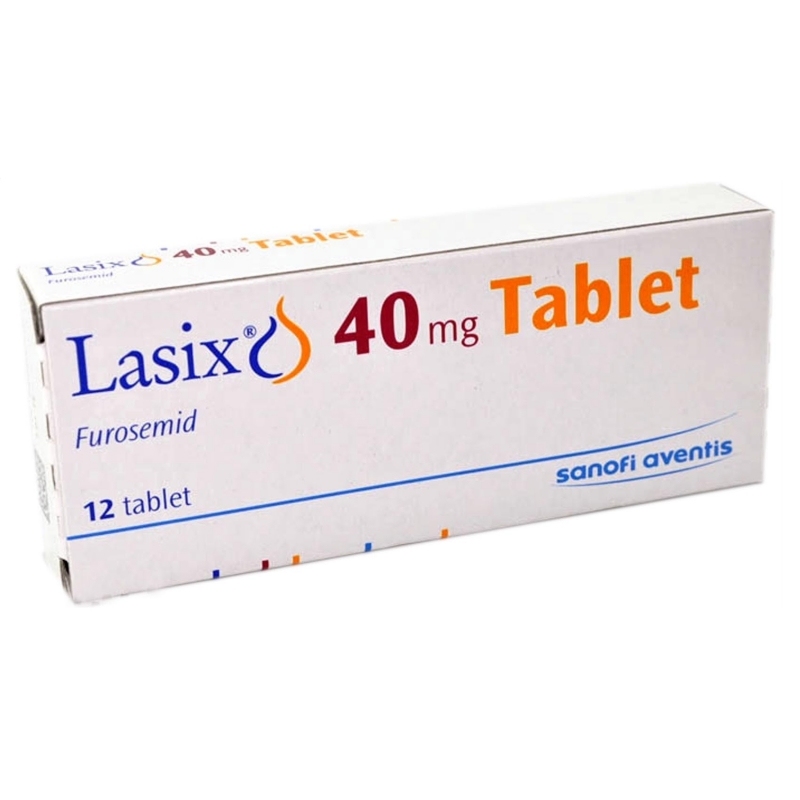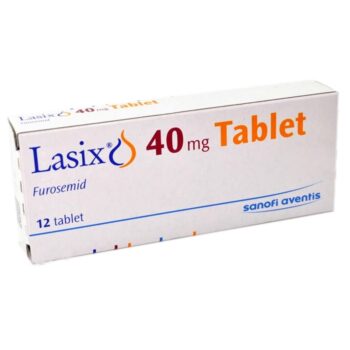Overview
LASIX 40mg Tablets, manufactured by Sanofi, are a potent diuretic medication primarily used to treat conditions related to fluid retention (edema) and high blood pressure (hypertension). Each tablet contains 40mg of Furosemide, a loop diuretic that works by inhibiting the reabsorption of sodium and chloride in the kidneys, leading to increased urine production and the elimination of excess fluid from the body.
Indications and Uses
LASIX 40mg Tablets are prescribed for the management of several medical conditions, including:
- Edema: This is the primary use of LASIX. Edema can result from various conditions, such as congestive heart failure, liver cirrhosis, and kidney disorders (e.g., nephrotic syndrome). By promoting diuresis, LASIX helps reduce fluid buildup in tissues, thereby alleviating symptoms like swelling in the legs, ankles, and other parts of the body.
- Hypertension: LASIX is also effective in treating high blood pressure. By reducing the volume of fluid in the blood vessels, the medication helps lower blood pressure, reducing the risk of stroke, heart attack, and other cardiovascular events.
- Hypercalcemia: LASIX can be used in the treatment of high calcium levels in the blood. It enhances the excretion of calcium, making it useful in conditions like hyperparathyroidism and certain cancers that cause elevated calcium levels.
- Acute Pulmonary Edema: In emergency situations, LASIX can be used to rapidly reduce the buildup of fluid in the lungs, which can be life-threatening. This is often associated with heart failure.
Mechanism of Action
Furosemide, the active ingredient in LASIX, is classified as a loop diuretic. It specifically acts on the thick ascending limb of the loop of Henle in the kidneys. Here’s how it works:
- Inhibition of Sodium and Chloride Reabsorption: Furosemide blocks the sodium-potassium-chloride cotransporter (NKCC2) in the loop of Henle. This inhibition prevents the reabsorption of sodium and chloride ions, leading to their increased excretion in the urine.
- Increased Urine Production: By inhibiting sodium and chloride reabsorption, Furosemide promotes the excretion of water along with these electrolytes, increasing urine output. This diuretic effect helps reduce fluid buildup in the body.
- Reduction of Blood Pressure: The decrease in blood volume due to increased urine production leads to a reduction in blood pressure. This is particularly beneficial in patients with hypertension.
- Calcium Excretion: Furosemide also increases the excretion of calcium in the urine, which is why it can be used to treat hypercalcemia.
Dosage and Administration
Standard Dosage:
- For adults, the typical starting dose of LASIX 40mg is one tablet per day. However, the dosage may be adjusted based on the patient’s condition, response to treatment, and the specific condition being treated.
Administration Guidelines:
- LASIX 40mg Tablets should be taken orally with or without food. It is recommended to take the tablet in the morning to avoid nocturnal diuresis (excessive urination during the night).
- In cases of severe edema or hypertension, the dose may be increased under medical supervision.
- It is important to follow the prescribed dosage and not to exceed the recommended amount, as this can lead to dehydration and electrolyte imbalances.
Missed Dose:
- If a dose is missed, it should be taken as soon as possible. However, if it is almost time for the next dose, the missed dose should be skipped. Doubling up on doses to make up for a missed one is not advisable.
Overdose:
- Overdose symptoms may include severe dehydration, electrolyte imbalance, hypotension (low blood pressure), and kidney failure. If an overdose is suspected, immediate medical attention is required.
Side Effects
Like all medications, LASIX 40mg Tablets can cause side effects, although not everyone experiences them. Common side effects include:
- Electrolyte Imbalance: Due to the loss of sodium, potassium, and other electrolytes, patients may experience symptoms such as weakness, confusion, dizziness, and muscle cramps. Regular monitoring of electrolyte levels is important, and potassium supplements may be required.
- Dehydration: Excessive diuresis can lead to dehydration, which may present as dry mouth, thirst, reduced urine output, and low blood pressure. Patients are advised to maintain adequate fluid intake while using LASIX.
- Hypotension: A significant drop in blood pressure can occur, especially in patients who are also taking other antihypertensive medications. This can lead to dizziness, fainting, and, in severe cases, shock.
- Hearing Loss: Although rare, high doses of LASIX, particularly when given intravenously, can cause ototoxicity (damage to the ear), leading to temporary or permanent hearing loss. This is more common in patients with kidney problems or those receiving other ototoxic drugs.
- Skin Reactions: Allergic reactions such as rashes, itching, or more severe conditions like Stevens-Johnson syndrome can occur. Any sign of a severe skin reaction warrants immediate discontinuation of the medication and medical attention.
- Gastrointestinal Issues: Some patients may experience nausea, vomiting, diarrhea, or constipation. These effects are usually mild and transient.
Precautions and Warnings
- Kidney Function: LASIX should be used with caution in patients with severe kidney impairment. In some cases, it may exacerbate kidney function, particularly in those with existing renal disease.
- Liver Disease: Patients with liver cirrhosis or other hepatic conditions should use LASIX cautiously, as it can cause electrolyte imbalance and worsen hepatic encephalopathy (a condition that affects brain function).
- Gout: LASIX can increase uric acid levels in the blood, potentially triggering gout attacks in susceptible individuals.
- Diabetes: Furosemide can affect blood sugar levels, so diabetic patients need to monitor their glucose levels closely while taking LASIX.
- Pregnancy and Breastfeeding: LASIX should be used during pregnancy only if the potential benefit justifies the potential risk to the fetus. It can pass into breast milk, so breastfeeding mothers should consult their healthcare provider before using this medication.
- Drug Interactions: LASIX can interact with a variety of medications, including other diuretics, blood pressure medications, nonsteroidal anti-inflammatory drugs (NSAIDs), and certain antibiotics. Patients should inform their healthcare provider of all medications they are taking to avoid potential interactions.
Storage Instructions
- Temperature: Store LASIX 40mg Tablets at room temperature, between 15°C to 30°C (59°F to 86°F).
- Humidity: Keep the tablets in a dry place, away from excessive moisture.
- Light: Store the medication in a place protected from light.
- Packaging: Keep the tablets in their original packaging until use to protect them from environmental factors.
Conclusion
LASIX 40mg Tablets are a powerful diuretic medication that plays a crucial role in managing conditions like edema, hypertension, and hypercalcemia. Manufactured by Sanofi, this medication is trusted worldwide for its efficacy in promoting fluid and electrolyte balance in the body. However, due to its potent effects, LASIX must be used under strict medical supervision, with careful attention to dosage, potential side effects, and interactions with other medications.
Patients using LASIX should be regularly monitored for signs of dehydration, electrolyte imbalances, and other side effects. With proper usage, LASIX can significantly improve quality of life for patients suffering from conditions related to fluid retention and high blood pressure.











Reviews
There are no reviews yet.